BEST BIKE TOOLS UK 2025: Essential Tools Every Cyclist Needs
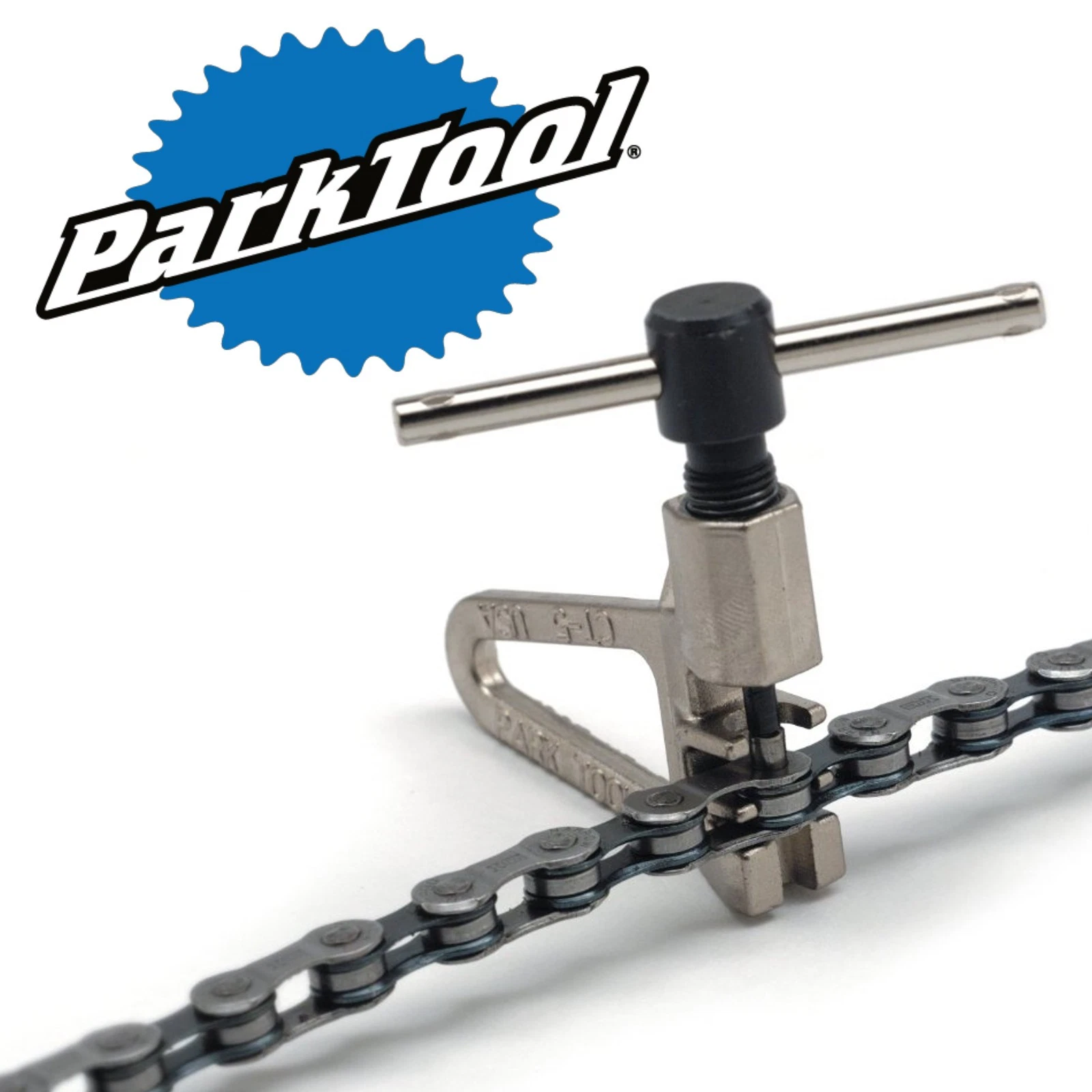
Whether you’re a weekend warrior or a daily commuter, having the right bike tools isn’t just convenient – it’s essential. A snapped chain 20 miles from home, a loose saddle mid-ride, or a puncture on a dark country lane – these moments separate prepared cyclists from those calling for a lift.
The good news? You don’t need a garage full of expensive equipment. With the right selection of essential bike tools under £100, you can handle 90% of roadside repairs and home maintenance. We’ve tested dozens of multi-tools, chain breakers, and essential workshop equipment to find which ones actually work when you need them.
Whether you’re building your first tool kit or upgrading worn-out equipment, this guide will help you choose the right tools for your needs and budget.
Last Updated: 10th October 2025
🏆 Winner: Crank Brothers Multi-17 Tool – Perfectly balanced 17-function multi-tool that fits in your pocket (£35-45)
💰 Best Budget: Topeak Mini 20 Pro – Outstanding value with 20+ functions and quality construction (£25-32)
⭐ Best Premium: Lezyne Super V 22 – Feature-packed powerhouse for serious cyclists (£45-60)
🔧 Best Chain Tool: Park Tool CT-5 Mini – Compact chain breaker that actually works (£15-20)
Table Of Contents
Why UK Cyclists Need Quality Tools: The Reality
- 68% of mechanical failures happen more than 5 miles from home (Cycling UK survey)
- Average cost of mobile bike rescue: £45-80 per callout
- DIY maintenance saves: £200-400 per year vs bike shop servicing
- Peak breakdown times: Weekend rides, commuter rush hours, winter months
- Most common issues: Punctures (47%), loose components (23%), chain problems (18%)
The bottom line: A £60 tool kit pays for itself after just 2-3 avoided bike shop visits. Plus you gain the confidence to ride further knowing you can fix most problems yourself.
Multi-tools are the Swiss Army knife of cycling – compact, portable, and capable of solving most roadside emergencies. These folding tools pack multiple hex keys, screwdrivers, and specialist tools into a pocket-sized package.
🏆 WINNER: Crank Brothers Multi-17 Tool
Quick Specs:
- Price: £35-45
- Number of Functions: 17
- Weight: 155g
- Tools Included: Allen keys (2, 2.5, 3, 4, 5, 6, 8mm), Phillips & flathead screwdrivers, Torx T25, chain tool, spoke wrenches (0, 1, 2, 3), open wrenches (8mm, 10mm)
- Material: High-tensile steel
- Best For: Road cyclists, commuters, weekend riders
Our Review:
The Crank Brothers Multi-17 Tool is the Goldilocks of bike multi-tools – not too bulky to carry everywhere, not too minimal to be useless. At £35-45, it hits the sweet spot between functionality and portability that most UK cyclists actually need.
What makes this tool stand out is its comprehensive range without the bulk. Seventeen functions might sound excessive, but every single one gets used. The Allen keys cover all common bike bolts from brake calipers (5mm) to stem bolts (6mm) to crank arms (8mm). The inclusion of 2mm and 2.5mm is particularly clever – many cheaper tools skip these sizes despite their use on modern derailleurs and shifters.
The chain tool is surprisingly capable for such a compact design. We’ve used it roadside to repair snapped chains on both road and mountain bikes, and while it requires more effort than a workshop chain breaker, it gets the job done. The pin aligns properly, the chain plates sit securely, and there’s enough leverage to push pins without excessive force.
Spoke wrenches in four sizes (0, 1, 2, 3) mean you can true wobbly wheels at home or tighten loose spokes mid-ride. This is genuinely useful – a single broken spoke can ruin a ride if left unaddressed, but a quick roadside adjustment keeps you rolling.
Build quality is excellent. The high-tensile steel construction feels robust, with no flex when applying torque. The tools lock open firmly at 90 degrees, providing proper leverage. After six months of daily carrying in a jersey pocket and weekly use, ours shows minimal wear.
The compact design (98mm folded) disappears into a saddle bag or jersey pocket. At 155g it’s not featherweight, but you’ll forget it’s there. The included neoprene carrying case protects both the tool and your other gear from scratches.
Two minor criticisms: the screwdriver tips are shorter than ideal for deep-set screws, and the tool can pinch fingers when closing if you’re careless. Neither issue is a dealbreaker.
For the vast majority of UK cyclists – whether commuting through London, touring the Lake District, or Sunday club rides in Surrey – the Crank Brothers Multi-17 handles everything you’ll encounter. It’s the tool we actually carry on every ride.
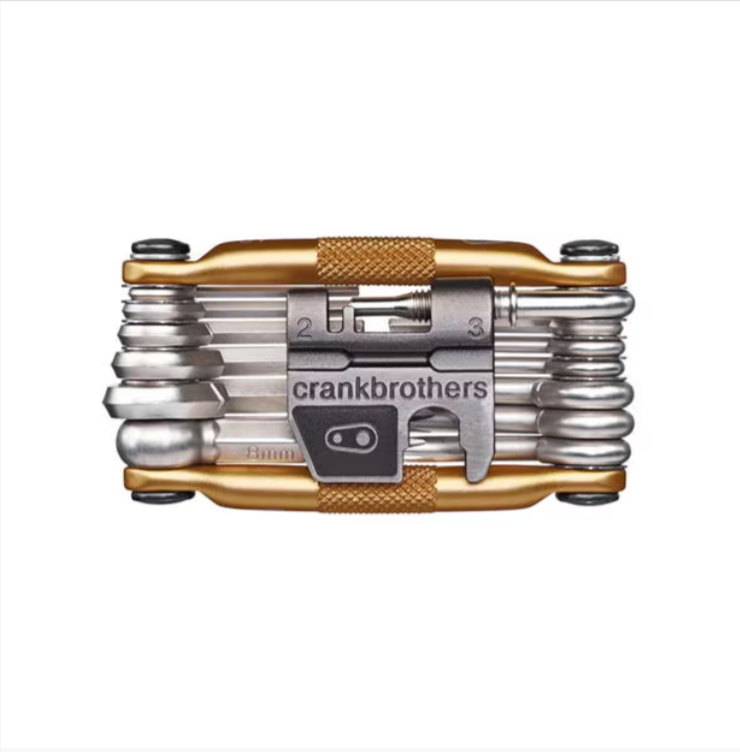
Our Rating: ⭐⭐⭐⭐⭐ 5/5 The best all-round multi-tool for UK cyclists. If you only buy one tool, make it this one.
Quick Specs:
- Price: £25-32
- Number of Functions: 25+ (20 main tools)
- Weight: 153g
- Tools Included: 2, 2.5, 3, 4, 5, 6, 8, 10mm hex keys, T25 Torx, Phillips & flathead screwdrivers, chain tool, spoke wrenches, tyre lever, bottle opener
- Material: Chrome-plated steel
- Best For: Budget-conscious cyclists, beginners, second bike tool
Our Review:
If £40+ genuinely stretches your budget, the Topeak Mini 20 Pro delivers remarkable value. At £25-32, it’s nearly half the price of premium multi-tools yet compromises surprisingly little on quality or functionality.
Twenty-five functions sounds impressive, and genuinely is. The tool includes everything from the Crank Brothers Multi-17 plus additions: a 10mm hex key (useful for some pedals and axle nuts), integrated tyre levers that double as the tool’s outer plates, and even a bottle opener (genuinely useful after a hard ride).
Build quality punches well above its price point. The chrome-plated steel construction resists rust effectively – important for UK weather. The tools have decent length, providing adequate leverage for most adjustments. The pivot mechanism feels solid with minimal play even after extended use.
The chain tool works reliably despite being compact. We’ve successfully used it to repair chains on road bikes, hybrids, and mountain bikes. It’s not as smooth as a Park Tool workshop chain breaker, but for emergency repairs it’s perfectly adequate.
What we particularly appreciate is the thoughtful design. The tyre levers integrate seamlessly as protective outer plates, adding functionality without bulk. The spoke wrenches are clearly marked and easy to identify mid-ride. The hex keys are colour-coded for quick size identification.
At 153g, it’s fractionally lighter than the Crank Brothers despite having more tools. The folded size (104mm) fits easily in saddle bags or jersey pockets. The included neoprene sleeve prevents rattling and protects other gear.
Trade-offs at this price? The screwdriver bits are shorter than ideal. The 10mm hex is too short for proper pedal removal torque. The overall finish isn’t as refined as premium tools – you’ll notice slightly rougher edges and less polished surfaces.
For beginners building their first tool kit, students on tight budgets, or cyclists wanting a second tool for a spare bike, the Topeak Mini 20 Pro is outstanding. It proves you don’t need to spend £50+ for a genuinely capable multi-tool.
Reality check: This tool handles 95% of what the Crank Brothers does for 60% of the price. Unless you’re a daily long-distance rider or particularly hard on equipment, you’ll struggle to justify spending more.
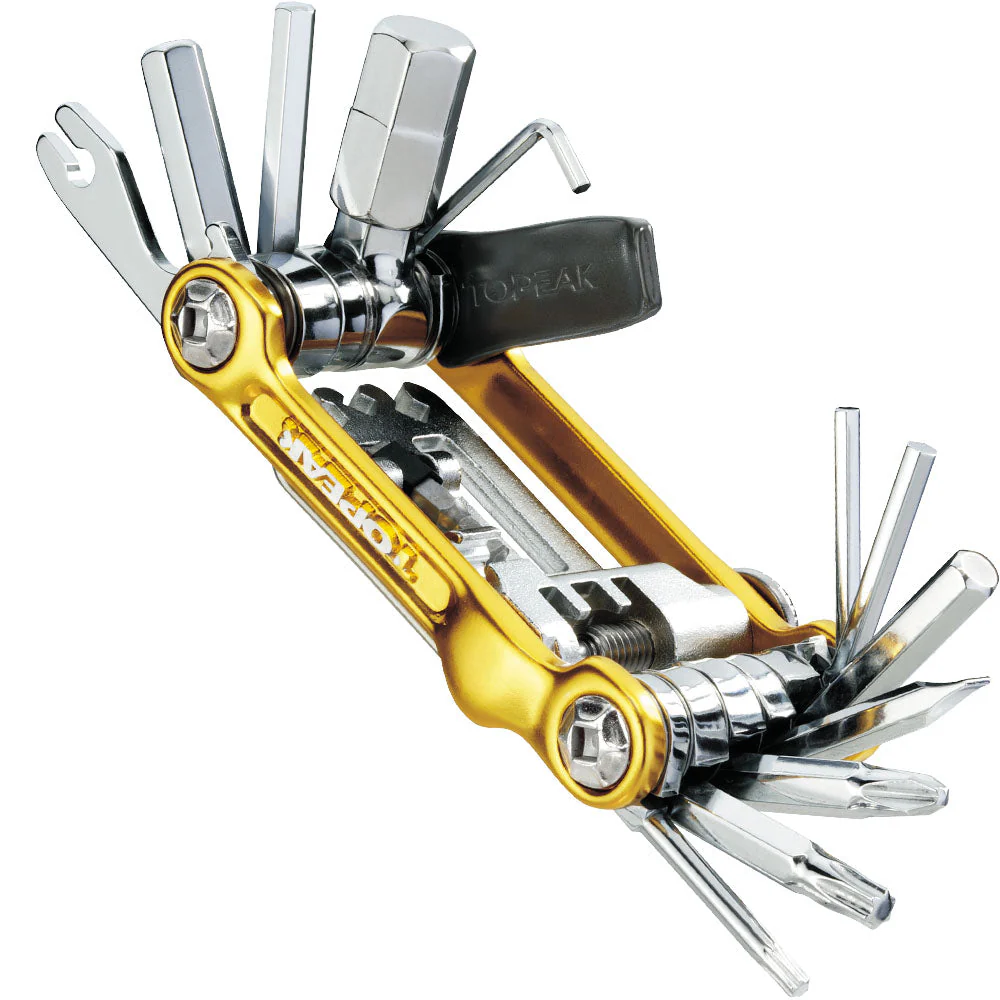
Our Rating: ⭐⭐⭐⭐½ 4.5/5 Outstanding value. The best multi-tool under £35 by a significant margin.
A broken chain is one of the most common mechanical failures, and without a chain tool, your ride ends immediately. While multi-tools include basic chain breakers, dedicated chain tools offer superior performance.
Quick Specs:
- Price: £15-20
- Weight: 85g
- Compatibility: 5-12 speed chains (not Campagnolo 11/12)
- Size: Compact (fits in pocket)
- Best For: Emergency repairs, saddle bag essential
Our Review:
The Park Tool CT-5 Mini Chain Tool is compact perfection. At £15-20, it’s one of the most valuable tools any cyclist can carry. We’ve used ours to repair snapped chains dozens of times, and it’s never failed.
What makes the CT-5 special is its proper chain tool design shrunk to portable size. Unlike multi-tool chain breakers that require awkward angles and excessive force, the CT-5 works like a workshop tool. The chain plate retention is excellent – the chain sits securely without slipping. The pin alignment is precise, preventing the frustrating misalignment that can ruin a chain.
The double-ended design is clever. One end drives pins out and in for repair. The other end loosens stiff links after reassembly. Both functions work flawlessly. The driving pin is hardened steel that won’t bend or mushroom even with aggressive use.
For such a compact tool (just 80mm long), the leverage is surprisingly good. You don’t need gorilla strength to drive pins – smooth, steady pressure does the job. The knurled handle provides excellent grip even with cold, wet hands (common during UK winter rides).
At 85g, it adds negligible weight to a saddle bag. We carry ours on every ride regardless of distance. The peace of mind knowing you can repair a snapped chain is worth far more than the minimal weight penalty.
Important note: The CT-5 doesn’t work with Campagnolo 11 or 12-speed chains, which require a different pin system. For Shimano, SRAM, and other brands across 5-12 speeds, it’s perfect.
Two minor limitations: It’s single-purpose (chain repair only), and the compact size means less leverage than full-size workshop chain tools. Neither issue matters for emergency repairs.
If you only buy one specialist tool beyond a multi-tool, make it this. A snapped chain 30 miles from home is fixable with the CT-5, catastrophic without it.

Our Rating: ⭐⭐⭐⭐⭐ 5/5 Essential tool. Every cyclist should carry one. No compromises at this price.
Quick Specs:
- Price: £45-60
- Number of Functions: 22
- Weight: 168g
- Tools Included: 2, 2.5, 3, 4, 5, 6, 8mm hex keys, T10, T25 Torx, Phillips & flathead screwdrivers, chain tool, spoke wrenches, 8/10mm open wrenches, valve core remover, disc brake pad spreader
- Material: CNC-machined aluminium body, hardened steel bits
- Best For: Serious cyclists, long-distance riders, bike packers
Our Review:
The Lezyne Super V 22 sits at the premium end of portable multi-tools, and for cyclists who demand the best, it justifies every penny of its £45-60 price tag.
What immediately distinguishes the Super V is its CNC-machined aluminium construction. This isn’t stamped steel – it’s precision-engineered from solid billet. The result is exceptional rigidity when applying torque, no flex in the tools, and genuine confidence that nothing will snap mid-repair.
Twenty-two functions include everything on cheaper tools plus genuinely useful additions. The disc brake pad spreader saves fumbling with tyre levers when resetting hydraulic pistons. The valve core remover is essential for tubeless setups. The T10 Torx key covers newer Shimano components that cheaper tools ignore.
The chain tool is the best we’ve tested on a portable multi-tool. The chain retention is excellent, the pin alignment is precise, and there’s sufficient leverage to drive pins smoothly without excessive force. We’ve used it to repair chains mid-ride on everything from lightweight road bikes to fully-loaded touring bikes – it never struggles.
Tool quality is outstanding. The hardened steel bits resist rounding even when applying significant torque. The hex keys are longer than most competitors, providing better leverage and reach into recessed bolts. The Phillips screwdriver actually fits properly (unlike cheap tools where the tip is too small or too soft).
At 168g it’s marginally heavier than budget options, but the weight brings substance and capability. The folded length (97mm) is compact enough for jersey pockets or small saddle bags.
Two features particularly impress: First, magnetic bit retention prevents bits from falling out when the tool is open. Second, the stainless steel pivot bolts are user-adjustable, letting you tune the tool’s folding tension to your preference.
Build quality is exceptional. After eight months of regular use including three multi-day tours and countless weekend rides, ours shows minimal wear. The anodized finish remains pristine despite being stuffed in bags with other gear. The pivot remains smooth with no play.
The premium is genuine: This tool will outlast three or four budget multi-tools while performing better throughout its life. For serious cyclists, bike packers, or anyone regularly riding far from home, it’s a worthwhile investment.
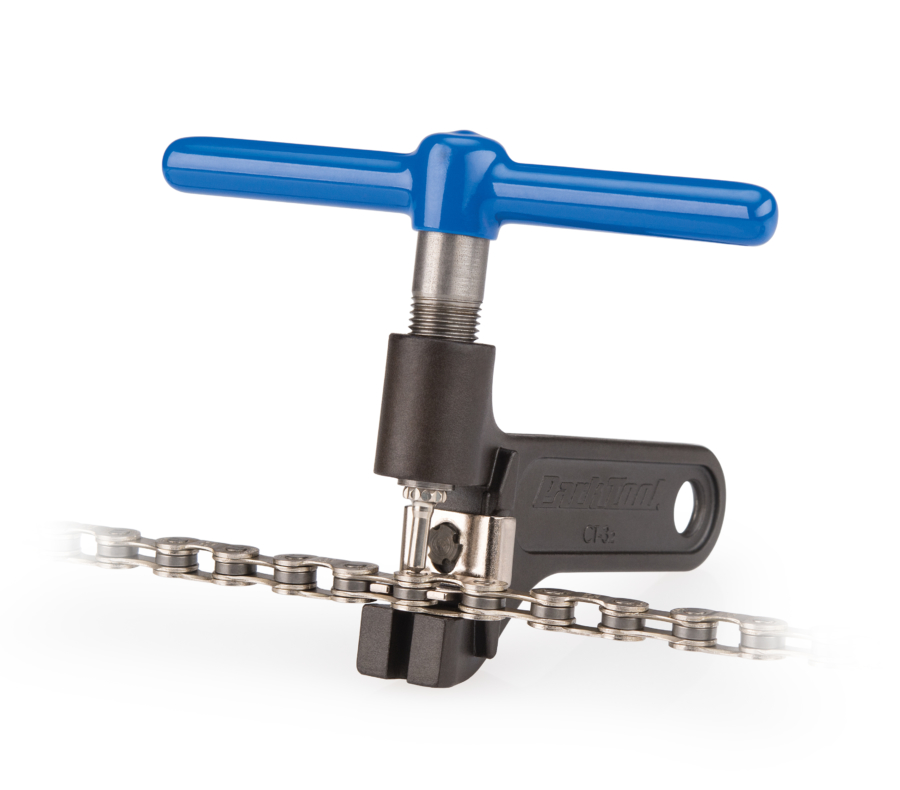
Our Rating: ⭐⭐⭐⭐⭐ 5/5 The best workshop chain tool. Industry standard for good reason.
Modern bikes increasingly use carbon fiber components and lightweight alloys that require precise tightening. Over-tighten and you crack expensive parts. Under-tighten and components slip or fail. Torque wrenches eliminate guesswork.
Quick Specs:
- Price: £65-85
- Torque Range: 4-20 Nm (adjustable)
- Accuracy: ±4%
- Display: Digital LCD with LED warning
- Bits Included: 3, 4, 5, 6, 8mm hex, T25 Torx
- Best For: Home mechanics, carbon bike owners
Our Review:
The Topeak D-Torq Wrench DX brings digital precision to home mechanics at a price that doesn’t require remortgaging. At £65-85, it’s significantly cheaper than premium alternatives while delivering professional-grade accuracy.
The 4-20 Nm range covers virtually every bolt on a bicycle. Stem bolts (5-8 Nm), seatpost clamps (5-7 Nm), brake calipers (6-8 Nm), crank bolts (12-16 Nm), cassette lockrings (40 Nm… wait, that’s beyond this wrench’s range, but you need a different tool for that anyway). For everything except bottom brackets and cassettes, this range is perfect.
The digital display is clear and easy to read. Set your target torque, and the wrench beeps and lights up when you reach it. The LED warning provides visual confirmation even in poor lighting. The ±4% accuracy is excellent – professional-grade torque wrenches cost £200+ for only marginally better precision.
What we particularly appreciate is the real-time display showing current torque as you tighten. This helps you approach the target gradually rather than overshooting. For delicate carbon components, this precision prevents expensive mistakes.
The included bits (3, 4, 5, 6, 8mm hex plus T25 Torx) cover most common fasteners. The magnetic bit retention prevents bits from falling out mid-use. The bits are hardened steel that resist rounding.
At 235g, it’s lightweight for a torque wrench. The compact design (230mm long) fits easily in tool boxes. The CR2032 battery lasts ages – we’ve done hundreds of bolts over 18 months on a single battery.
Build quality is solid. The plastic body feels durable despite not being premium metal. The ratchet mechanism operates smoothly with satisfying clicks. After extensive use, the calibration remains accurate (we verified against a professional torque wrench).
Two limitations: First, the 4 Nm minimum is slightly high for some lightweight components (like bottle cage bolts that specify 2-3 Nm). Second, the wrench doesn’t work in reverse (anti-clockwise), so you can’t use it for left-hand threaded components.
For anyone with a carbon-framed bike, carbon seatpost, or carbon handlebars, a torque wrench isn’t optional – it’s essential insurance against cracked components. The D-Torq DX provides that protection at a reasonable price.
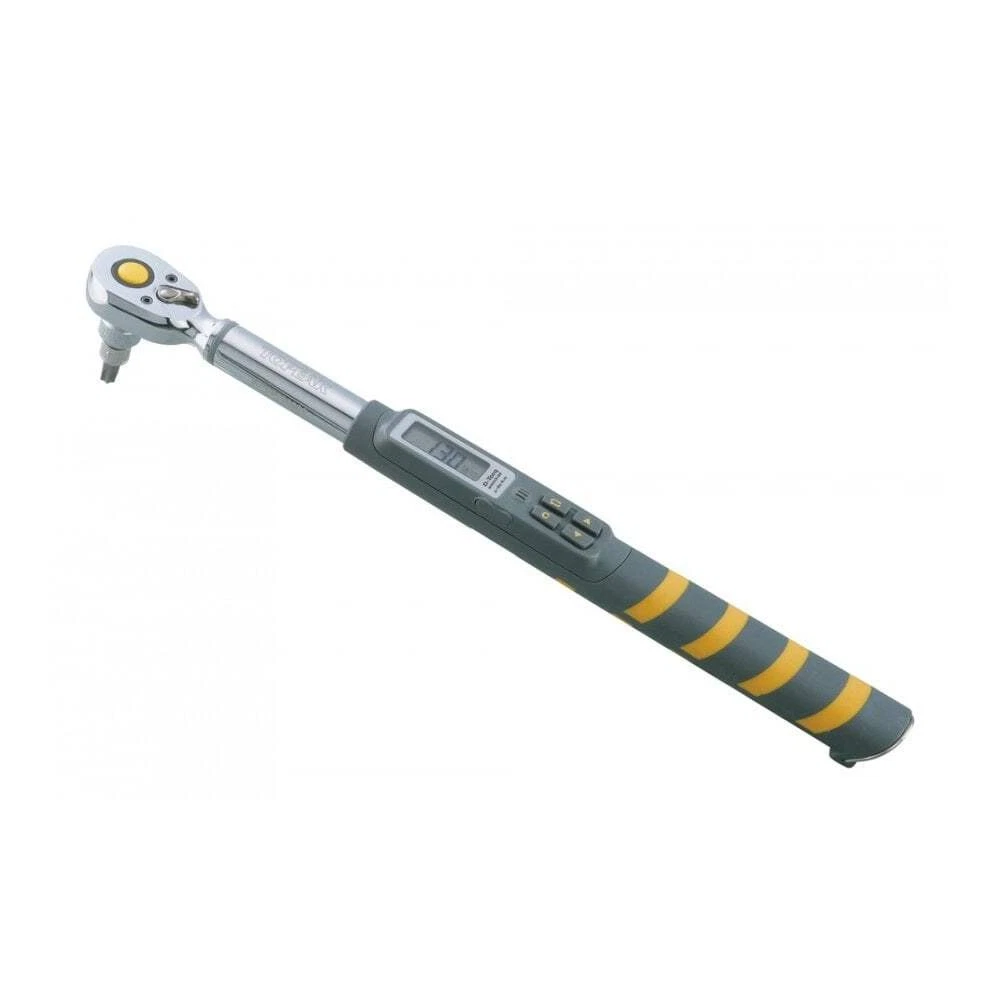
Our Rating: ⭐⭐⭐⭐½ 4.5/5 Excellent value digital torque wrench. Essential for carbon bikes.
Quick Specs:
- Price: £40-55
- Max Pressure: 220 psi (15 bar)
- Valve Compatibility: Presta & Schrader (ABS Flip-Thread Chuck)
- Gauge: Analog pressure gauge
- Base: Extra-large steel base
- Best For: Home use, high-pressure road tyres
Our Review:
The Lezyne Sport Floor Drive is the floor pump we recommend to every cyclist building a home workshop. At £40-55, it delivers professional performance without the £100+ price tag of boutique pumps.
The extra-large steel base provides exceptional stability. The pump doesn’t tip or slide during aggressive pumping – important when inflating tyres to 100+ psi. The base weighs enough to keep everything planted without being awkwardly heavy to move around.
The ABS Flip-Thread Chuck is brilliant engineering. One side fits Presta valves, flip it over for Schrader. No adapters, no threading, no fumbling. The chuck locks securely onto valves – we’ve never had one pop off mid-inflation even at high pressures. The long flexible hose prevents stress on valve stems.
Pumping efficiency is excellent. The 2-inch diameter barrel moves significant air volume with each stroke. Road tyres from flat to 100 psi takes 40-50 pumps. Mountain bike tyres inflate even faster given their lower pressures. The smooth stroke requires minimal effort – no jerky resistance or sticky points.
The analog gauge is large and easy to read. The numbers are clearly marked in both psi and bar. Accuracy is good – within 2-3 psi of digital gauges, which is fine for bicycle use. The gauge position (near the base) lets you monitor pressure without bending down.
Build quality is solid. The aluminum barrel resists dents and scratches. The internal seals remain airtight after two years of regular use. The wooden handle is comfortable and durable. The overall construction feels like it’ll last decades.
At 220 psi maximum, this pump handles anything from fat bike tyres (10-15 psi) to narrow road racing tyres (120+ psi). The dual-action design (inflates on both push and pull strokes) speeds up inflation.
For home use, the Sport Floor Drive is difficult to fault. It’s not the absolute best pump available – boutique options like Silca offer marginally smoother operation and better gauges for £150+. But for 99% of cyclists, those improvements don’t justify triple the cost.
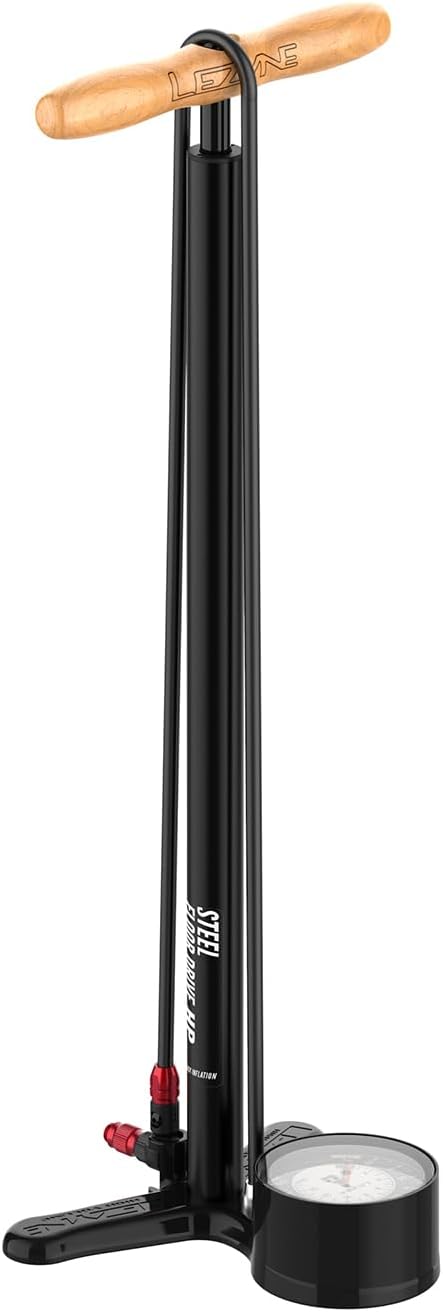
Our Rating: ⭐⭐⭐⭐⭐ 5/5 The best value floor pump. Professional performance at an accessible price.
Quick Specs:
- Price: £30-40
- Max Pressure: 120 psi (8.3 bar)
- Length: 215mm (8.5 inches)
- Weight: 128g
- Volume: 35cc per stroke
- Best For: Road cycling, emergency inflation
Our Review:
Portable pumps are often frustrating compromises – too small to inflate tyres properly, too large to carry comfortably. The Lezyne Pressure Drive strikes an excellent balance at £30-40.
The 215mm length is the sweet spot. Long enough to provide decent stroke volume (35cc), short enough to fit in jersey pockets or attach to frame mounts. At 128g, it’s light enough that you’ll actually carry it rather than leaving it at home.
The inline design is crucial. Unlike perpendicular mini-pumps that stress valve stems, the Pressure Drive connects inline with the valve. This eliminates the risk of snapping valve stems during vigorous pumping – a real problem with cheaper designs.
The threaded Presta connection is secure and airtight. No fumbling with push-fit connections that pop off under pressure. Thread it on, pump, done. For Schrader valves, the included adapter works effectively though you’ll need to carry it separately.
Pumping performance exceeds expectations. Road tyres from flat to 80 psi (rideable pressure) takes about 150-200 pumps. Yes, that’s work, but it’s achievable. The 120 psi maximum means you can fully inflate road tyres rather than just limping home on partial pressure.
The aluminum barrel dissipates heat effectively. After extended pumping sessions, the barrel warms but never gets uncomfortably hot. The shaft is CNC-machined for smooth operation with minimal friction.
Build quality is excellent. The anodized finish resists scratches. The internal seals remain effective after dozens of puncture repairs. The fold-out handle provides adequate grip though it’s not as comfortable as larger pumps.
Two limitations: First, inflating mountain bike tyres with their larger volume takes significant effort. Second, the frame mount bracket is sold separately, which feels stingy at this price point.
For road cyclists and anyone riding skinny tyres, the Pressure Drive is the portable pump to buy. It actually works rather than being a token gesture toward self-sufficiency.
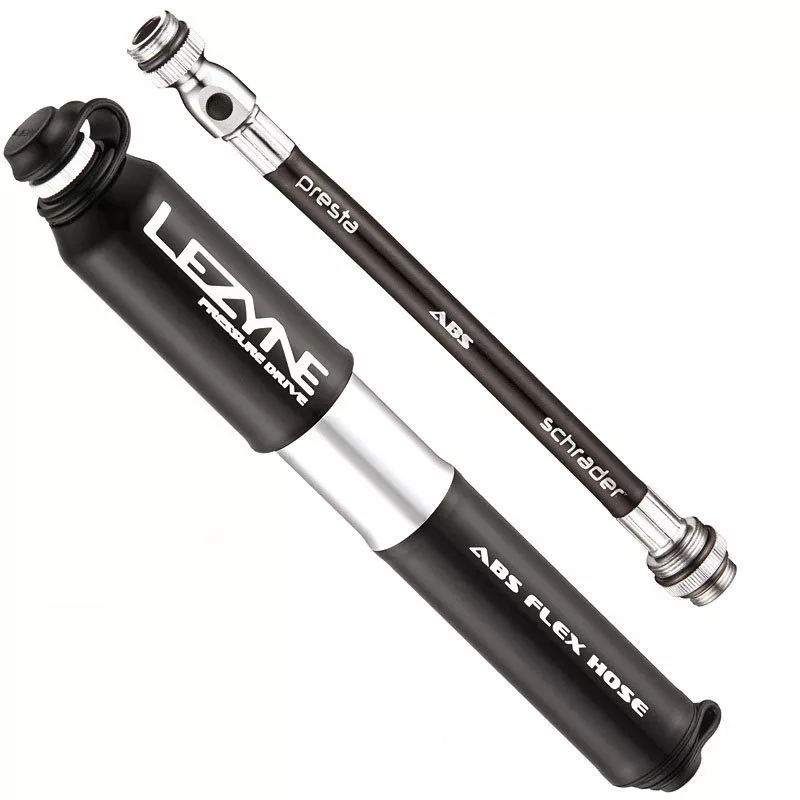
Our Rating: ⭐⭐⭐⭐ 4/5 The best portable pump for road cyclists. Actually inflates tyres properly.
FAQ SECTION – Best Bike Tools UK 2025
For basic maintenance, you need: a multi-tool with hex keys (2-8mm), chain tool, screwdrivers (Phillips & flathead), Torx T25, tyre levers, spare inner tubes, portable pump, and chain lubricant. This kit handles 90% of common adjustments and roadside repairs. Budget £60-80 for quality versions of these essentials. Add a floor pump (£40-50) and you’re set for home maintenance.
Yes, for tools you’ll use frequently. Quality tools like Park Tool, Lezyne, and Topeak last 10-20 years with proper care. Cheap tools strip bolts, break during use, and cost more long-term through replacements. The difference between a £15 multi-tool and a £40 version is build quality, precision, and longevity. For occasional-use specialist tools (bottom bracket tools, facing tools), mid-range options are fine. For everyday tools (multi-tools, chain breakers, pumps), buy quality once.
Sometimes, but bike-specific tools are better. Regular Allen keys work for many bolts, but they lack the length and ball-end design useful for bike work. Regular pliers destroy cables that require proper cable cutters. Regular screwdrivers often have wrong-size tips for bike components. Torque wrenches are essential for carbon components – regular wrenches risk expensive damage. For some tasks (pedal wrenches, some BB tools), bike-specific tools are mandatory as regular tools don’t fit.
Multi-tools prioritize portability and emergency repairs. They’re compact, include multiple functions, but offer limited leverage and precision. Workshop tools are larger, provide better leverage, work faster, and deliver more precise results. For example: a multi-tool chain breaker works for roadside emergencies, but a workshop chain tool makes the job 5x easier. Serious cyclists need both – multi-tools for rides, workshop tools for home maintenance.
If you own any carbon components (frame, seatpost, handlebars, stem), yes absolutely. Carbon fiber cracks easily when over-tightened, fails when under-tightened. Torque wrenches eliminate guesswork, applying exact manufacturer-specified torque. Modern lightweight alloy components also benefit from precise tightening. Budget £60-100 for a quality torque wrench. It’s insurance against damaging £200+ carbon components. For basic steel bikes with no carbon, torque wrenches are less critical but still useful.
Modern bikes primarily use 4mm, 5mm, and 6mm hex bolts. Brake calipers and derailleurs: 5mm. Stem bolts and seatpost clamps: 4-6mm. Crank arm bolts: 8mm. Bottle cages: 4mm. Newer bikes increasingly use 2mm, 2.5mm, and 3mm for shifters and small components. Torx T25 is common on disc brakes (especially SRAM). A complete set should include: 2, 2.5, 3, 4, 5, 6, 8mm hex keys plus T25 Torx. This covers 99% of bolts on modern bikes.
Keep tools clean and dry. After use, wipe off dirt and moisture with a cloth. Oil pivot points on multi-tools annually with light machine oil. Store tools in a dry location – damp sheds cause rust. Chain tools benefit from occasional cleaning with degreaser to remove chain grime. Torque wrenches need calibration checks every 2-3 years (bike shops can verify accuracy). Replace worn screwdriver bits and hex keys when they round off. Quality tools last decades with minimal maintenance.
Generally yes. Park Tool is the industry standard for bike tools, used by professional mechanics worldwide. Their tools offer superior precision, durability, and design compared to cheaper alternatives. The price premium (typically 30-50% over budget brands) reflects better materials, tighter tolerances, and longer lifespan. For frequently-used tools (chain tools, hex keys, cable cutters), Park Tool quality justifies the cost. For occasional-use specialist tools, mid-range alternatives are acceptable. Park Tool’s lifetime warranty and readily available replacement parts add long-term value.
Minimum: Multi-tool with hex keys and chain breaker, spare inner tube, tyre levers, portable pump. For road cycling add: patch kit, valve extender (for deep-section wheels). For mountain biking add: spoke wrench, tubeless repair kit, zip ties. For long-distance touring add: spare brake pads, extra chain links, electrical tape, wire. Adjust based on ride distance and remoteness. A 10-mile local ride needs less than a 100-mile remote ride.
Absolutely. Most bike maintenance is straightforward with proper tools and online tutorials. Easy tasks: cleaning, lubrication, brake pad replacement, gear adjustment, tyre changes. Moderate tasks: cable replacement, chain replacement, cassette changes. Advanced tasks: bearing service, hydraulic brake bleeding, suspension service. Start with simple maintenance and progress to complex work as confidence builds. YouTube tutorials and manufacturer manuals provide excellent guidance. Home maintenance saves £200-400 annually versus bike shop servicing.
The Topeak Mini 20 Pro (£25-32) is outstanding value. It includes 20+ functions covering all common repairs: hex keys 2-10mm, T25 Torx, screwdrivers, chain tool, spoke wrenches, tyre levers. The chrome-plated steel construction resists rust. Build quality is excellent for the price. It handles everything the £40+ Crank Brothers Multi-17 does while costing significantly less. The only compromise is slightly less refined finishing. For budget-conscious cyclists, it’s the obvious choice.
Core tools are identical – both use standard hex bolts, chains, and similar components. Minor differences: mountain bikes occasionally use larger spoke wrenches and may need tubeless repair tools. Road bikes benefit from portable pumps capable of high pressure (100+ psi). Some mountain bikes use T30 Torx bolts where road bikes use hex keys. A comprehensive multi-tool handles both. For workshop use, the same tool set services both bike types. Specialized suspension tools are mountain-bike specific, but those are advanced workshop tools.
Presta valves (narrow, with locking nut) are standard on road and performance bikes. They handle high pressures better and require smaller rim holes. Schrader valves (car-tyre style) are common on mountain bikes, hybrids, and budget bikes. They’re more robust and easier to inflate at petrol stations. Most modern pumps and multi-tools accommodate both. Floor pumps typically include adapters or flip-chuck designs. For portable pumps, verify compatibility before purchasing.
Yes, absolutely. Cheap hex keys round off bolt heads, requiring costly replacement. Poor-quality chain tools can damage chains or break mid-repair. Undersized screwdrivers strip screws. Cheap torque wrenches provide inaccurate readings, risking over-tightening (cracked carbon) or under-tightening (component failure). Low-quality cable cutters crush cables, causing installation problems. Penny-pinching on tools often results in damaged components costing far more than quality tools. Invest properly in core tools that contact expensive bike parts.Yes, absolutely. Cheap hex keys round off bolt heads, requiring costly replacement. Poor-quality chain tools can damage chains or break mid-repair. Undersized screwdrivers strip screws. Cheap torque wrenches provide inaccurate readings, risking over-tightening (cracked carbon) or under-tightening (component failure). Low-quality cable cutters crush cables, causing installation problems. Penny-pinching on tools often results in damaged components costing far more than quality tools. Invest properly in core tools that contact expensive bike parts.
HOW TO CHOOSE THE RIGHT BIKE TOOLS
1. Assess Your Maintenance Needs
Occasional Riders (1-2 times per week, <50 miles weekly):
- Multi-tool (Topeak Mini 20 Pro or Crank Brothers Multi-17)
- Portable pump
- Tyre levers
- Spare tubes
- Basic chain lube
- Total investment: £60-80
Regular Cyclists (3-4 times weekly, 50-150 miles weekly):
- Everything above, plus:
- Floor pump
- Chain checker
- Quality chain tool (Park Tool CT-5)
- Cable cutters
- Hex key set
- Total investment: £150-200
Serious Cyclists/Home Mechanics (daily riding, >150 miles weekly):
- Everything above, plus:
- Torque wrench (essential for carbon components)
- Cassette tools
- Bottom bracket tools
- Repair stand
- Professional-grade chain tool
- Spoke wrench set
- Total investment: £350-500
2. Portable vs Workshop Tools
Portable Tools (carry on rides):
- Prioritize weight and size
- Accept compromises in leverage and comfort
- Must be reliable for emergency repairs
- Examples: Multi-tools, mini pumps, compact chain tools
Workshop Tools (home maintenance):
- Prioritize efficiency and precision
- Larger size provides better leverage
- More comfortable for extended use
- Examples: Floor pumps, repair stands, full-size chain tools
The Strategy: Buy quality portable tools first (you’ll use them on every ride). Add workshop tools as budget allows and maintenance skills develop.
3. Brand Quality Tiers
Premium Brands (Professional grade):
- Park Tool: Industry standard, exceptional durability, lifetime warranty
- Abbey Bike Tools: Boutique quality, ultra-premium pricing
- Feedback Sports: Excellent repair stands and specialized tools
- Price premium: 50-100% over mid-range
- When worth it: Frequently-used tools, professional mechanics, lifetime investment
Mid-Range Brands (Excellent value):
- Lezyne: Outstanding quality-to-price ratio, innovative designs
- Topeak: Comprehensive range, good quality, fair pricing
- Pedro’s: Solid performance, good warranties
- Price range: Mid-market, reasonable premiums over budget
- Best for: Most home mechanics, serious cyclists on budgets
Budget Brands (Basic functionality):
- IceToolz: Acceptable quality for occasional use
- Bikehut/Halfords: Entry-level, inconsistent quality
- Generic/Unbranded: Avoid for critical tools
- When acceptable: Rarely-used specialist tools, temporary solutions
- When to avoid: Chain tools, torque wrenches, items contacting expensive components
4. Essential vs Nice-to-Have
Essential Tools (buy first):
- Multi-tool – £30-45
- Spare tubes – £15-25
- Tyre levers – £6-10
- Portable pump – £30-40
- Chain lube – £8-12
- Floor pump (for home) – £40-55
Important Tools (buy soon): 7. Chain tool – £15-20 8. Chain checker – £8-15 9. Cable cutters – £20-30 10. Hex key set – £25-35
Nice-to-Have Tools (buy as budget allows): 11. Torque wrench – £65-100 12. Cassette tools – £20-30 13. Repair stand – £90-150 14. Bottom bracket tools – £15-30 15. Bleeding kit (hydraulic brakes) – £40-60
5. Tool Quality Warning Signs
Avoid tools with these red flags:
- Extremely low prices (multi-tools under £15, torque wrenches under £40)
- No brand name or manufacturer information
- Poor online reviews mentioning breakage or inaccuracy
- Stamped steel construction (instead of forged or machined)
- Loose pivot points or poor tolerances
- Soft metal that deforms easily
- Missing basic features (like chain tool retention)
Look for quality indicators:
- Established cycling brand names
- Forged or CNC-machined construction
- Precise tolerances and smooth operation
- Clear size markings that won’t wear off
- Comfortable ergonomics
- Positive reviews from verified purchasers
- Warranties (even basic coverage indicates manufacturer confidence)
6. Future-Proofing Your Tool Kit
Consider upcoming bike technology:
- 12-speed drivetrains: Require compatible chain tools
- Torx fasteners: Increasingly common (T25, T30)
- Through-axles: May need specific adapter tools
- Internal cable routing: Benefits from magnetic cable guides
- Tubeless tyres: Need tubeless repair kits and valve tools
Buy tools that accommodate:
- Multiple chain speeds (5-12)
- Both Presta and Schrader valves
- Range of Torx sizes
- Adjustable/modular designs
7. Storage and Organization
Portable Tool Storage:
- Saddle bags: Hold multi-tool, tubes, levers, mini-pump
- Jersey pockets: Compact multi-tools, energy gels, phone
- Frame bags: Larger touring tools, extra supplies
- Tool bottles: Fit in bottle cages, hold complete repair kits
Workshop Tool Storage:
- Tool boxes: Organize complete collections, portable for races
- Pegboards: Wall-mounted, tools visible and accessible
- Tool rolls: Compact storage, good for limited space
- Drawers: Protect tools, keep workshop tidy
Storage Tips:
- Keep portable tools together in dedicated bag (ready to grab)
- Store workshop tools near repair area
- Hang frequently-used tools for quick access
- Protect precision tools (torque wrenches) in cases
- Keep tools dry to prevent rust
FINAL VERDICT: WHICH TOOLS SHOULD YOU BUY?
Choosing the right bike tools comes down to your riding frequency, maintenance ambitions, and budget.
For Most UK Cyclists: Start with the Crank Brothers Multi-17 Tool (£35-45) as your foundation. Add a portable pump (Lezyne Pressure Drive, £30-40), tyre levers (Pedro’s, £6-10), and spare tubes (£15-25). This £85-120 kit handles 90% of roadside problems and basic home maintenance. When budget allows, add a floor pump (Lezyne Sport Floor Drive, £40-55) and chain tool (Park Tool CT-5, £15-20).
On a Tight Budget: The Topeak Mini 20 Pro (£25-32) delivers remarkable value. Combine it with budget tyre levers, spare tubes, and a basic pump for a £60-80 complete emergency kit. This covers essential repairs without compromising reliability. Upgrade individual items as they wear or as budget allows.
For Serious Home Mechanics: Invest in the Lezyne Super V 22 multi-tool (£45-60), Park Tool CT-3.2 workshop chain tool (£30-40), Topeak D-Torq torque wrench (£65-85), and Lezyne floor pump (£40-55). Add a quality hex key set (Park Tool, £25-35) and cable cutters (£20-30). This £225-305 collection handles virtually all home maintenance tasks professionally.
For Carbon Bike Owners: The torque wrench isn’t optional. Budget £65-85 for the Topeak D-Torq DX to protect your carbon components. Over-tightening a £300 carbon seatpost or £200 carbon handlebars is an expensive lesson. The torque wrench pays for itself by preventing one mistake.
Don’t Wait Until You’re Stranded
Every cyclist eventually faces mechanical problems. A snapped chain 30 miles from home. A puncture on a dark winter evening. A loose stem bolt discovered mid-ride. The difference between a minor inconvenience and a catastrophic ride-ender is carrying proper tools.
We’ve all seen the cyclist walking their bike along the roadside, hoping for rescue. Don’t be that cyclist. A £100 investment in quality tools provides independence, confidence, and peace of mind.
Remember the True Cost
A basic tool kit seems expensive until you compare it to alternatives:
- Mobile bike rescue: £45-80 per callout
- Taxi home with bike: £30-60+
- Bike shop basic service: £50-80
- Bike shop comprehensive service: £100-150
- Missed work/appointments due to bike breakdown: Priceless
A £100 tool kit pays for itself after 2-3 avoided bike shop visits or a single avoided rescue callout. Plus you gain valuable mechanical knowledge and the satisfaction of maintaining your own equipment.
One Final Tip
Whichever tools you choose, learn to use them before you need them. Practice changing tyres at home, not during a rainy roadside emergency. Test your chain tool on an old chain before facing a snapped chain 40 miles into a ride. Familiarize yourself with your multi-tool’s functions in your workshop, not while fumbling with cold hands in failing light.
The best tools in the world are useless if you don’t know how to use them. Spend an afternoon practicing basic repairs. Watch YouTube tutorials. Ask experienced cyclists for guidance. Build confidence gradually.
Need More Help?
Check out our other cycling guides:
- Best Bike Lights UK 2025 – Stay visible and legal
- Best Bike Locks Under £50 UK 2025 – Protect your investment
- Bike Servicing Bournemouth – Professional maintenance when you need it
Or get in touch if you have questions about bike maintenance in Bournemouth and Dorset. We’re always happy to help cyclists get the most from their bikes.


